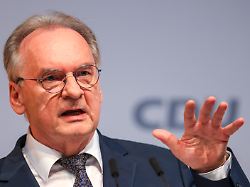Concern for livelihoods
Haseloff: Economic situation is driving East Germans to the AfD
December 23, 2023, 7:16 a.m
The AfD is successful nationwide, but is sometimes the strongest force in surveys in eastern German states. According to Saxony-Anhalt’s Prime Minister Haseloff, this is due to concerns about existence there. People with a GDR biography have experienced many upheavals. But there are solutions.
From the perspective of Saxony-Anhalt’s Prime Minister Reiner Haseloff, the economic situation is a main concern for many people in the East. “Surveys speak a clear language. People are asking themselves: Is my livelihood really secure or could the ground be pulled out from under me again?” said the CDU politician, referring to the biographies of many people after the end of the GDR.
“Some have had to start over five times and have experienced layoffs and bankruptcies. Because there is uncertainty about these issues again today, radical parties are currently so popular,” says Haseloff. “People are just very worried, they’ve already gone through these holes. It’s having an impact.”
According to more than 84 percent of medium-sized companies, the economic situation in Germany has worsened or even worsened significantly in the past twelve months. In a recently published survey by the Federal Association of Small and Medium-sized Businesses, around 43 percent of the medium-sized companies surveyed also stated that the situation of their own company had worsened. Around 40 percent also expect this for 2024.
AfD is at 23 percent nationwide
Haseloff sees a need for politicians to ensure cheaper energy prices and progress in integration. “The AfD doesn’t have the better people, they simply attract the entire mood. We still have it in our hands in the next few months to make it clear that we offer solutions. Clarity is needed when it comes to the economic situation and migration .” Haseloff has been head of government since 2011 and is now the longest-serving incumbent prime minister in Germany.
In the RTL/ntv trend barometer from the Forsa research institute, the AfD recently achieved a top score of 23 percent. This is the second highest figure of all parties after the CDU/CSU (31 percent). This is almost 13 percentage points higher than its result in the last federal election, when the party achieved 10.3 percent. The government parties, on the other hand, cannot get out of their current low in the polls. The SPD is at 14 percent (25.7 percent), the Greens reach 13 percent (14.8 percent), the FDP even has to worry about returning to the German Bundestag with 5 percent (11.5 percent). The Left currently has 3 percent (4.9 percent). 11 percent of voters would choose other parties.
